#HMSBeagle
Text
Unveiling the Evolutionary Genius: The Life of Charles Darwin 🌿🔬
Introduction: Charles Darwin, a name etched in the annals of scientific history, was no ordinary thinker. His life’s journey unfolded like a captivating novel, revealing the secrets of evolution. Let’s dive into the remarkable story of the man who changed our understanding of life on Earth.
Early Life and Background: Born in 1809 in England, 🇬🇧 young Charles showed an early fascination with…
View On WordPress
#Adaptability#Biology#CharlesDarwin#Curiosity#DarwinianInsights#EvolutionaryGenius#FamilyMan#HMSBeagle#Legacy#NaturalSelection#NatureObservations#OriginofSpecies#ScientificHistory#ScientificRevolution
0 notes
Text
Ze Bulb Is Kaput And Further Adventures Over Ze French Border
Off To France In A Battered Renault 16
These days, I feel a bit like old Charles Darwin, both of us sitting in our studies, sifting through all that stuff gathered on our youthful voyages of discovery, him on HMS Beagle, and me in that wine red Renault 16 that drove all the way from Holland to France that first time.
The Beagle Has Landed …. Charles Darwin
I thought we would be in Cadillac, and Loupiac, and Verdelais, and all those…

View On WordPress
0 notes
Text
Charles Darwin's Life and Works

Who was Charles Darwin?

Photo by WikiImages. Source: Pixabay.
Charles Darwin is perhaps one of the most famous scientists in history, known primarily for his theories on evolution. But what many people don't know is that he was also a highly accomplished naturalist who made significant contributions to other areas of science as well.
In this article, we'll take a look at Charles Darwin's life and work, and explore some of his most important theories.
Charles Darwin was born in 1809, the fifth child of Robert and Susannah Darwin. His father was a successful doctor, while his grandfather Erasmus had made a fortune in the pottery business.
Charles initially showed little interest in academics, preferring instead to collect insects and go riding. However, he eventually settled down and studied medicine at the University of Edinburgh.
Setting Sail on HMS Beagle
After graduating, Darwin had no clear career plans. His father wanted him to become a clergyman, but Charles was not sure if this was the right path for him. Instead, he decided to embark on a journey around the world on the HMS Beagle.
The voyage lasted five years and during that time, Darwin made many observations about the natural world, which would later prove instrumental in developing his theories on evolution.
Upon returning to England, Darwin began working on a book about his travels, which was published in 1839. He also started to develop his ideas about evolution, and in 1859 he finally published his landmark work On the Origin of Species.

Shrewsbury School. Photo by Ell Brown. Flickr.
His Early Life and Education
Charles Darwin was born on February 12, 1809, in Shrewsbury, England. His father, Robert Darwin, was a doctor and his mother, Susannah Darwin, was the daughter of an affluent society family.
As a child, Charles Darwin loved nature and often went for walks with his father to collect insects. When Charles Darwin was eight years old, he was sent to Shrewsbury School. There he studied Latin and Greek grammar and learned about science from his teachers John Stevens Henslow and Adam Sedgwick.
Charles Darwin also attended Christ's College in Cambridge from 1828 to 1831. Initially intending to follow in his father's footsteps and become a doctor, Charles Darwin changed his mind after attending lectures by naturalist John Stevens Henslow.
These lectures sparked Charles Darwin's interest in biology and geology, setting him on the path to becoming one of the most famous scientists in history.

Photo by Andres Zorko. Pixabay.
Importance of His Voyage on the Beagle
Charles Darwin is best known for his theory of evolution, but his work on the subject began during a five-year voyage aboard the Beagle. The Beagle was a tall sailing ship that set sail from England in December of 1831.
It was during this voyage that Darwin first began to take an interest in geology and biology. He was particularly struck by the similarities between the animals he saw in South America and those in Africa. This led him to develop his ideas about the common ancestry of all life forms.
In addition, Darwin's observations of the fossils in South America convinced him that species could change over time. These ideas would eventually form the basis of his theory of evolution by natural selection.
The Beagle voyage was a pivotal experience for Charles Darwin, and it ultimately helped him to formulate his groundbreaking theory of evolution.

Evolution. Photo by Alexa. Pixabay.
The Theory of Evolution
Charles Darwin's theory of evolution is one of the most important scientific theories of all time. It helps to explain the development of life on Earth and how new species come into existence.
Before Darwin's work, many people believed that each species was created by a divine being and that they remained unchanged over time.
However, Darwin's observations and research showed that this was not the case. He observed that there was a great deal of variation within species and that some of this variation could be passed down from generation to generation.
He also noted that populations tended to produce more offspring than could survive, leading to a struggle for existence.
These ideas formed the basis of his theory of natural selection, which states that individuals with advantageous traits are more likely to survive and reproduce than those without these traits. Over time, this process can lead to the emergence of new species.
Darwin's theory revolutionized our understanding of life on Earth and is still an important part of scientific research today.

Slavory protesters. Image by WikiImages. Pixabay.
Charles Darwin the Humanitarian
Charles Darwin was an English naturalist and geologist, best known for his contributions to the science of evolution. His work helped to change the way we think about the natural world, and his theory of evolution by natural selection is one of the most important scientific discoveries of all time.
However, Darwin was not just a great scientist; he was also a humanitarian who campaigned for social reform and against slavery.
In 1838, he joined the Anti-Slavery Society and became an active campaigner against slavery and the slave trade. He also spoke out against other social injustices, such as child labor and poverty.
Charles Darwin was a man of great intelligence and compassion, who used his influence to make the world a better place. In modern terms he would be considered the ultimate influencer.

Image by Craig Chilton. Unsplash.
Later Years and Legacy
Charles Darwin was a groundbreaking figure in the world of science. His theory of evolution by natural selection changed the way we think about the natural world, and his work continues to be relevant today.
In his later years, Darwin continued to study and write about a wide range of topics, including plant physiology and animal behavior. He also worked on a comprehensive study of earthworms, which was published posthumously.
Darwin's legacy extends far beyond his scientific achievements. He is also celebrated for his humble and open-minded approach to research, as well as his dedication to spending time with his family and friends.
Charles Darwin left a lasting mark on the world, and his contribution to our understanding of life on Earth is immeasurable.
Conclusion
Charles Darwin was a great scientist and humanitarian who made significant contributions to our understanding of life on Earth. His work is still relevant today, and he is celebrated for his dedication to family and friends.
Charles Darwin's legacy extends far beyond his scientific achievements, and he will always be remembered as one of the most important figures in the history of science.
Sources: THX News, Wikipedia & Natural History Museum.
Read the full article
0 notes
Photo

#Repost @rassilonpod • • • • • • Team TARDIS and Charles Darwin battle the deadly Barnacloids. The Doctor gets salty. Travis learns his VITAL stats. ⛵️ #thegameofrassilon #doctorwho #doctorwhorpg #charlesdarwin #actualplaypodcast #barnacles #hmsbeagle #gameofrassilon #newepisode #podernfamily #outnow https://www.instagram.com/p/CB1CjxCDwvJ/?igshid=18n14innjmcba
#repost#thegameofrassilon#doctorwho#doctorwhorpg#charlesdarwin#actualplaypodcast#barnacles#hmsbeagle#gameofrassilon#newepisode#podernfamily#outnow
0 notes
Photo

Buddy
Metlakatla, Annette Island, Alaska 2017
2 notes
·
View notes
Photo

Roulement de tambours !!!!! 🖤 IL EST DE RETOUR !!! 🖤 ENFIN ! Le nuage prédiction, véritable station de prévisions météorologiques ! En totale rupture chez le fournisseur… Vous êtes nombreux à me l’avoir réservé, les sms sont partis ce matin ! ATTENTION ! Vous savez qu’il part très vite !! Doit-on faire un heureux pour la fête des pères ? Vous pouvez aussi passer commande sur notre site : https://www.wanderlust-conceptstore.com/curiosités/produits/storm-cloud-nuage-prevision/#cc-m-product-12407114287. Belle journée à toutes et à tous. #nuage #stormclouds #stormcloud #cloud #temps #predictions #shopping #amiens #wanderlust #wanderlustconceptstore #conceptstore #deco #design #decorer #decoration #accessoires #geek #designinterior #homeinterior #instadeco #passiondeco #amenagement #amenagementinterieur #cosyhome #cosy #maison #home #charlesdarwin #hmsbeagle小獵犬號 #amiralfitzroy #instaaddict #fetedesperes #papa #jetaime #plaisirdoffrir #cadeaux (à Wanderlust concept store)
#predictions#accessoires#wanderlust#charlesdarwin#decoration#design#cadeaux#amiralfitzroy#geek#deco#amenagement#designinterior#hmsbeagle小獵犬號#cloud#cosyhome#stormclouds#homeinterior#shopping#conceptstore#passiondeco#instadeco#maison#nuage#temps#wanderlustconceptstore#stormcloud#amenagementinterieur#instaaddict#amiens#jetaime
1 note
·
View note
Photo

Roteiro de Viagem - Busco patrocinador para uma viagem de férias!!! Gostaria de dar a volta ao mundo refazendo a Viagem de Charles Darwin no HMS Beagle, fotografando e reescrevendo o seu diário!!! #darwin #charlesdarwin #beagle #hmsbeagle
0 notes
Photo

Galapagos Porgy (Calamus taurinus). #SciArt by Benjamin Waterhouse Hawkins for Charles Darwin, Voyage of H.M.S. Beagle, Part 4 (Fish) (1842). Contributed for digitization in #BiodiversityHeritageLibrary by MBLWHOI Library, which supports @mblwoodshole and @woodshole_ocean. http://www.biodiversitylibrary.org/page/14063562 ~~~~~~~~~~~~~~~~~~~~~~~~~~~~~~~~~~~~~~~ #GalapogosPorgy #Porgy #Galapogos #Fish #Ichthyology #CharlesDarwin #HMSBeagle #BHLib #Biodiversity #NaturalHistory #NatHist #ScientificIllustration #ScientificArt #OpenAccess #Libraries #Archives #SpecialCollections #LibrariesofInstagram #IGLibraries #IG_Libraries #MBLWHOI
#scientificart#libraries#librariesofinstagram#mblwhoi#bhlib#biodiversity#fish#biodiversityheritagelibrary#scientificillustration#ig_libraries#ichthyology#archives#iglibraries#openaccess#galapogos#naturalhistory#sciart#specialcollections#nathist#charlesdarwin#hmsbeagle#galapogosporgy#porgy
14 notes
·
View notes
Photo

New book! #HMSBeagle #Darwin #atx #austin #austintx #Radiance
0 notes
Text
Ze Bulb Is Kaput And Further Adventures Over Ze French Border
One of the most joyful of all the writing mysteries is how you can start off on topic, just putting down what you had mapped out in your head — but you end up writing something else entirely.
It’s like you let go the oars, or at least stop steering, and just go where the musings and the swells take you. You are all at sea, only in a good way: it’s like you’re watching your own show.
These…
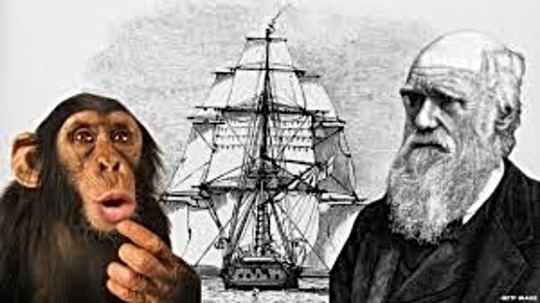
View On WordPress
0 notes
Text
The Work of Charles Darwin

Charles Darwin was, and still is, one of the most influential individuals in scientific history. His work has shaped our understanding of evolutionary biology and had a lasting impact on all areas of science.
Indeed, if it wasn’t for his theories that humans and other species have changed over time through natural selection, many major advancements in both medicine and genetics would not have been possible.
So what did Charles Darwin do exactly? In this article, we will explore the life-long journey of discovery that formed the basis for his theory of evolution by natural selection.
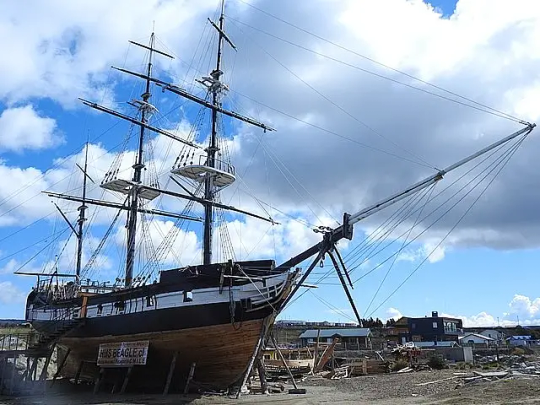
Full size replica of Charles Darwins HMS Beagle. Photo by Bombalot. Wikimedia.
Introducing Charles Darwin – Overview of his life and accomplishments
Charles Darwin (1809-1882) was an evolutionary biologist and naturalist whose discoveries raised disruptive questions about the nature of species, the origins of life, and scientific exploration. After witnessing and documenting various specimens during a trip aboard the HMS Beagle, Darwin proposed his groundbreaking concept that people, other animals, and plants had evolved by natural selection.
Darwin proposed that organisms must evolve in order to fit into their changing environment to survive and he called this process 'Survival of the Fittest'.
Thanks to writings such as 'On the Origin of Species' and 'The Descent of Man', Darwin has profoundly shaped science and given us insights into the mode in which life functions and how it came to be.
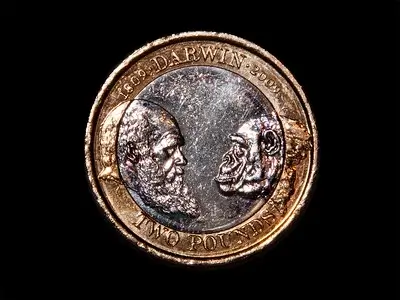
Charles Darwin 200 Years of Evolution £2 Coin. Photo by CGP Grey. Flickr.
Darwin’s Theory of Evolution – Exploring his groundbreaking discoveries
Charles Darwin's Theory of Evolution serves as a cornerstone for much of modern scientific thought. In his groundbreaking work, "On The Origin Of Species by Means Of Natural Selection,"
Darwin proposed the idea that species evolve over time through natural selection; in other words, advantageous traits within animals provide them with a better chance to survive and pass on these traits to their offspring, who carry the same characteristics.
This concept challenged the earlier beliefs that God created the Earth in six days (Creationism) and ultimately it changed the way scientists view nature today. Instead of an immutable structure set in place by a higher power, Darwin proposed that nature progresses through generations and is ever-evolving.
Darwin's Theory has been confirmed numerous times over as science has progressed and continues to help shape biological studies around the world.
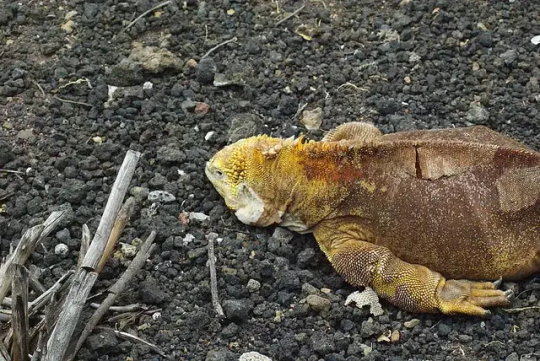
Galapagos Land Iguan - Conolophus subcristatus at the Charles Darwin Research Station, Santa Cruz, Galapagos Islands. Photo by Dallas Krentzel. Flickr.
The Voyage of the Beagle – How this trip shaped Darwin’s Thinking
Charles Darwin set sail on the ship HMS Beagle on December 27, 1831, from Plymouth, England. He was only 22 years old when he was hired to be the ship's naturalist, on a five-year journey mostly spent sailing around South America.
Darwin's five-year journey aboard the Beagle left an indelible impression on him. He observed and collected specimens from every place he visited, including exotic tropical rainforests in South America, coral atolls in the South Pacific, and active volcanoes in Indonesia.
Darwin encountered many unique species during this voyage - something he hadn't experienced before - which challenged his views on creation.
As his observations accumulated, he began to slowly develop his own theory about the evolution of species through natural selection. Thus, by piecing together evidence from further afield than had ever been studied before, he was able to formulate his theory of evolution.
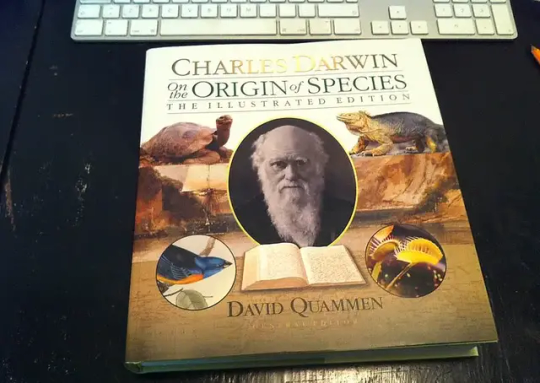
On the Origin of Species. Photo by Jeena Paradies. Flickr.
On the Origin of Species – Examining the Impact of his book on Science and Society
When Charles Darwin published “On the Origin of Species” in 1859, it sparked a revolution in scientific thought. This book put forth a compelling thesis — that species evolved over time due to natural selection — and it profoundly transformed our understanding of how organisms were related to one another and how they had come to be.
It was truly a pivotal moment in the history of science, ushering in an era of evolutionary biology and genetics.
Outside of the world of science, Darwin’s work also inspired heated debates over its implications for religion, ultimately leading some to question Creationism. As we approach its 160th anniversary, it is evident that “On the Origin of Species” left its mark on both science and society alike.
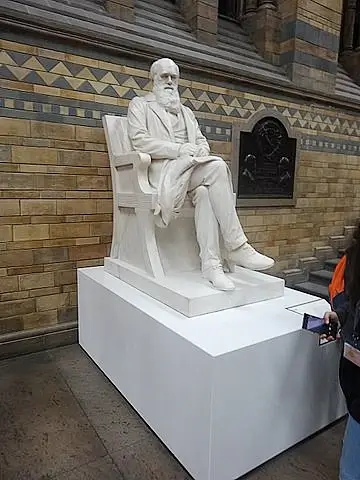
Statue of Charles Darwin - Natural History Museum, London. Photo by Jordiferrer. Wikimedia.
Legacy of Charles Darwin – Impact of his research today and into the future
The legacy of Charles Darwin is hard to overstate. His groundbreaking research into evolutionary theory had tremendous implications for our understanding of the natural world and its development. Darwin’s research sparked a passion in many people to better appreciate, understand, and protect modern ecosystems throughout the planet.
Even today, his principles are fundamental to conservation efforts involving species reintroduction, preservation of endangered animals, and even farming practices like crop rotation.
As we look towards the future, it stands to reason that the influence of Charles Darwin's work will only grow as scientific innovation accelerates and, hopefully, this will inspire more people to become stewards of the Earth and live in harmony with nature.
In conclusion, Charles Darwin's life achievements and discoveries revolutionized the field of science and changed the way we understand life on Earth.
His historic voyage across the world on H.M.S. Beagle opened his eyes to new ways of thinking and led him to formulate his Theory of Evolution, which is still widely accepted today as the fundamental explanation of how species adapt and survive over time. He then wrote and published On The Origin Of Species, which he supported with scientific, evidence-based observations.
His incredible contributions to science live on today in classrooms, laboratories, and natural history museum exhibits around the world - all testament to an incredibly influential scientist who grounded evolutionary principles in hard evidence and paved the way for future scientific advancements.
Conclusion
In the 160 years since Charles Darwin published On The Origin Of Species, his work has revolutionized science and had a lasting impact on society. His groundbreaking research into evolutionary theory sparked debates about Creationism and inspired many to become stewards of the Earth.
Even today, we still rely on principles laid out by Darwin in order to better understand how species evolve over time. As scientific innovation continues, it is likely that the influence of this remarkable scientist will only grow.
We should all strive to recognize and appreciate the immense contributions made by Charles Darwin throughout history so that future generations can continue to benefit from them for years to come.
Sources: THX News & Wikipedia.
Read the full article
0 notes
Photo

A new episode of @rassilonpod is live! The Doctor's grief is broken when Travis receives a strange summons that lands the TARDIS on the HMS Beagle - near a young Charles Darwin. But there's something in the water... Link in bio! • #DoctorWho #DrWho #doctorwhorpg #doctorwhoroleplayinggame #tabletop #tabletopgames #roleplaying #roleplayinggame #roleplayinggames #rpg #DND #podcast #Comedy #actualplay #darwin #charlesdarwin #hmsbeagle @cubicle7 https://www.instagram.com/p/CBQj450FdPa/?igshid=vrclyglf7fie
#doctorwho#drwho#doctorwhorpg#doctorwhoroleplayinggame#tabletop#tabletopgames#roleplaying#roleplayinggame#roleplayinggames#rpg#dnd#podcast#comedy#actualplay#darwin#charlesdarwin#hmsbeagle
0 notes
Photo

Drôle de petit nuage ☁️ qui peut prédire le temps, comme l’a fait l’amiral Fitzroy lors de son voyage avec Charles Darwin, à bord du HMS Beagle. Que ce soit en haute mer ou sur la table du capitaine, le liquide à l’intérieur du nuage indiquera ce que le temps nous réserve. En vente aussi sur : https://www.wanderlust-conceptstore.com/curiosités/produits/storm-cloud-nuage-prevision/#cc-m-product-12407114287. Bonne journée et bonne semaine. #nuage #stormclouds #stormcloud #cloud #temps #predictions #shopping #amiens #wanderlust #wanderlustconceptstore #conceptstore #deco #design #decorer #decoration #accessoires #geek #designinterior #homeinterior #instadeco #passiondeco #amenagement #amenagementinterieur #cosyhome #cosy #maison #home #charlesdarwin #hmsbeagle小獵犬號 #amiralfitzroy #capitaine (à Wanderlust concept store)
#cc#deco#cosyhome#amenagement#hmsbeagle小獵犬號#conceptstore#temps#charlesdarwin#wanderlust#passiondeco#decoration#amenagementinterieur#maison#homeinterior#cosy#predictions#amiens#amiralfitzroy#wanderlustconceptstore#decorer#instadeco#geek#home#designinterior#capitaine#stormcloud#nuage#shopping#accessoires#design
0 notes
Photo

HMS BEAGLE Charles Darwin's exploration ship. Build in progress. Working on deck fittings now. I work on it off and on between my other projects. Hope to finish in this lifetime! #hmsbeagle #charlesdarwin #shipbuilding #shipmodel #shipmodeling #woodmodel #sailing #sailingship
0 notes
Text
The Work of Charles Darwin

Charles Darwin was, and still is, one of the most influential individuals in scientific history. His work has shaped our understanding of evolutionary biology and had a lasting impact on all areas of science.
Indeed, if it wasn’t for his theories that humans and other species have changed over time through natural selection, many major advancements in both medicine and genetics would not have been possible.
So what did Charles Darwin do exactly? In this article, we will explore the life-long journey of discovery that formed the basis for his theory of evolution by natural selection.

Full size replica of Charles Darwins HMS Beagle. Photo by Bombalot. Wikimedia.
Introducing Charles Darwin – Overview of his life and accomplishments
Charles Darwin (1809-1882) was an evolutionary biologist and naturalist whose discoveries raised disruptive questions about the nature of species, the origins of life, and scientific exploration. After witnessing and documenting various specimens during a trip aboard the HMS Beagle, Darwin proposed his groundbreaking concept that people, other animals, and plants had evolved by natural selection.
Darwin proposed that organisms must evolve in order to fit into their changing environment to survive and he called this process 'Survival of the Fittest'.
Thanks to writings such as 'On the Origin of Species' and 'The Descent of Man', Darwin has profoundly shaped science and given us insights into the mode in which life functions and how it came to be.

Charles Darwin 200 Years of Evolution £2 Coin. Photo by CGP Grey. Flickr.
Darwin’s Theory of Evolution – Exploring his groundbreaking discoveries
Charles Darwin's Theory of Evolution serves as a cornerstone for much of modern scientific thought. In his groundbreaking work, "On The Origin Of Species by Means Of Natural Selection,"
Darwin proposed the idea that species evolve over time through natural selection; in other words, advantageous traits within animals provide them with a better chance to survive and pass on these traits to their offspring, who carry the same characteristics.
This concept challenged the earlier beliefs that God created the Earth in six days (Creationism) and ultimately it changed the way scientists view nature today. Instead of an immutable structure set in place by a higher power, Darwin proposed that nature progresses through generations and is ever-evolving.
Darwin's Theory has been confirmed numerous times over as science has progressed and continues to help shape biological studies around the world.

Galapagos Land Iguan - Conolophus subcristatus at the Charles Darwin Research Station, Santa Cruz, Galapagos Islands. Photo by Dallas Krentzel. Flickr.
The Voyage of the Beagle – How this trip shaped Darwin’s Thinking
Charles Darwin set sail on the ship HMS Beagle on December 27, 1831, from Plymouth, England. He was only 22 years old when he was hired to be the ship's naturalist, on a five-year journey mostly spent sailing around South America.
Darwin's five-year journey aboard the Beagle left an indelible impression on him. He observed and collected specimens from every place he visited, including exotic tropical rainforests in South America, coral atolls in the South Pacific, and active volcanoes in Indonesia.
Darwin encountered many unique species during this voyage - something he hadn't experienced before - which challenged his views on creation.
As his observations accumulated, he began to slowly develop his own theory about the evolution of species through natural selection. Thus, by piecing together evidence from further afield than had ever been studied before, he was able to formulate his theory of evolution.

On the Origin of Species. Photo by Jeena Paradies. Flickr.
On the Origin of Species – Examining the Impact of his book on Science and Society
When Charles Darwin published “On the Origin of Species” in 1859, it sparked a revolution in scientific thought. This book put forth a compelling thesis — that species evolved over time due to natural selection — and it profoundly transformed our understanding of how organisms were related to one another and how they had come to be.
It was truly a pivotal moment in the history of science, ushering in an era of evolutionary biology and genetics.
Outside of the world of science, Darwin’s work also inspired heated debates over its implications for religion, ultimately leading some to question Creationism. As we approach its 160th anniversary, it is evident that “On the Origin of Species” left its mark on both science and society alike.

Statue of Charles Darwin - Natural History Museum, London. Photo by Jordiferrer. Wikimedia.
Legacy of Charles Darwin – Impact of his research today and into the future
The legacy of Charles Darwin is hard to overstate. His groundbreaking research into evolutionary theory had tremendous implications for our understanding of the natural world and its development. Darwin’s research sparked a passion in many people to better appreciate, understand, and protect modern ecosystems throughout the planet.
Even today, his principles are fundamental to conservation efforts involving species reintroduction, preservation of endangered animals, and even farming practices like crop rotation.
As we look towards the future, it stands to reason that the influence of Charles Darwin's work will only grow as scientific innovation accelerates and, hopefully, this will inspire more people to become stewards of the Earth and live in harmony with nature.
In conclusion, Charles Darwin's life achievements and discoveries revolutionized the field of science and changed the way we understand life on Earth.
His historic voyage across the world on H.M.S. Beagle opened his eyes to new ways of thinking and led him to formulate his Theory of Evolution, which is still widely accepted today as the fundamental explanation of how species adapt and survive over time. He then wrote and published On The Origin Of Species, which he supported with scientific, evidence-based observations.
His incredible contributions to science live on today in classrooms, laboratories, and natural history museum exhibits around the world - all testament to an incredibly influential scientist who grounded evolutionary principles in hard evidence and paved the way for future scientific advancements.
Conclusion
In the 160 years since Charles Darwin published On The Origin Of Species, his work has revolutionized science and had a lasting impact on society. His groundbreaking research into evolutionary theory sparked debates about Creationism and inspired many to become stewards of the Earth.
Even today, we still rely on principles laid out by Darwin in order to better understand how species evolve over time. As scientific innovation continues, it is likely that the influence of this remarkable scientist will only grow.
We should all strive to recognize and appreciate the immense contributions made by Charles Darwin throughout history so that future generations can continue to benefit from them for years to come.
Sources: THX News & Wikipedia.
Read the full article
0 notes
Photo

H.M.S. Beagle. . Alice Pattullo's latest screenprint, a wonderful homage to Charles Darwin, commissioned by @easternbiological. Another gem by Alice. #alicepattullo @easternbiological #charlesdarwin #screenprinting #folkart #hmsbeagle
13 notes
·
View notes